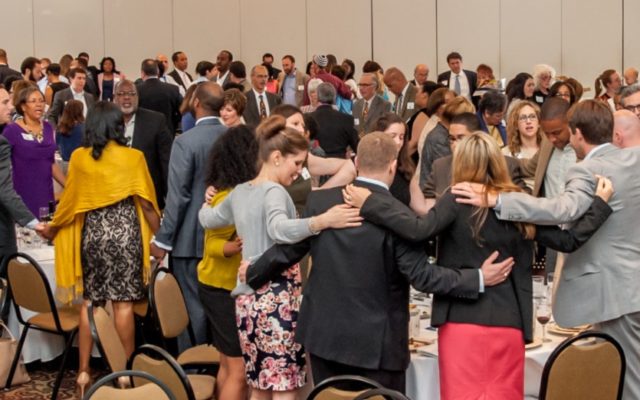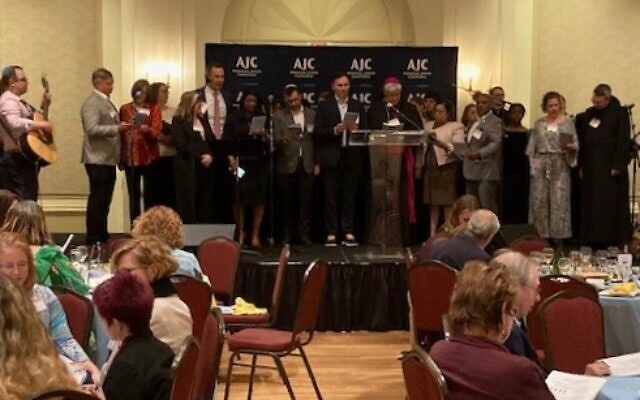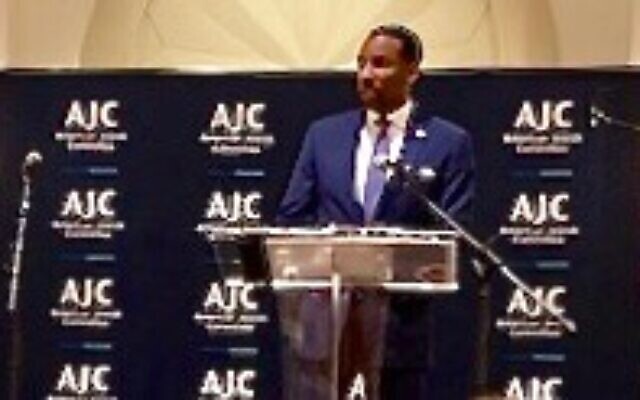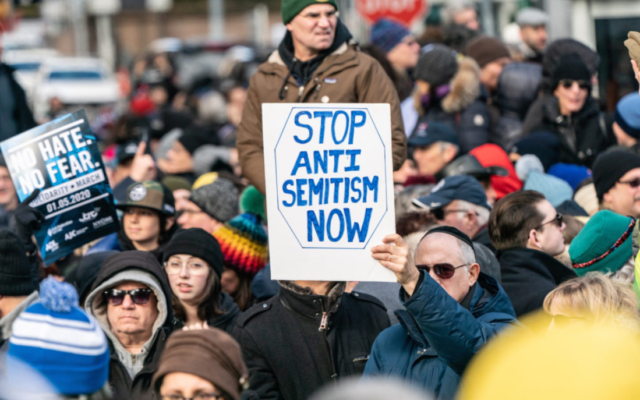AJC Unity Seder Seeks to Strengthen Entire Community
This year’s Unity Seder brought together a broad cross-section of participants at two area temples.

The American Jewish Committee’s Unity Seder, which is one of the major outreach efforts by the AJC to build a broad base of support in the community, was held Wednesday, March 29. For the first time, the event was held in two locations simultaneously. The larger gathering, in The Temple’s Social Hall, attracted about 350 and was led by Rabbi Loren Filson Lapidus, the synagogue’s senior associate rabbi. In a significant demonstration of The Temple’s newly expanded communications technology base, the gathering was linked virtually to Kol Emeth 18 miles away in Cobb County. At that location, Rabbi Larry Sernovitz hosted the evening.

According to Julie Katz, the AJC’s associate director, the expansion was an attempt to bring people in from distant locations without having to contend with a long drive during the weeknight rush hour. The program, which used a Haggadah created by the national office of the AJC, included a diverse audience of faith leaders that represented communities, ranging from Mormons to Muslims. This included the Rev. Shawn Smith, pastor of New Horizons Baptist Church, who is also a senior advisor to Atlanta Mayor Andre Dickens, the Rev. Jasmine Rose Smothers, pastor of the First United Methodist Church, and the Rev. Kevin Strickland, who is the Bishop for the Southeastern Synod of the Evangelical Lutheran Church.

The co-chair of the event was Missy Wallers, who is an active member of the Victory World Church, a non-denominational Christian congregation in Norcross. Her father, a Baptist church leader, was active in interfaith civil rights work during the early 1960s. She credits him with introducing her at an early age to the importance of working together in the community.
“I’m all for inclusivity and diversity. We live in Atlanta, and the two communities working together has been such a phenomenal blessing to my life.”

Wallers has long been active in the AJC’s Black-Jewish Coalition and the Coalition’s Project Understanding. She has also been a member of an interfaith team, Challa’d Greens, that placed third in the Ribs category at last year’s Atlanta Kosher BBQ Festival competition. Wallers was part of the decision in recent years to transform the Unity Seder from a bi-racial event to a multi-faith, multi-ethnic program.
“We thought, well, what a grand idea would that be, to have it become interfaith. So could you bring people from the community in to talk about this, this great moment in recognizing our sisters and brothers and sharing our own stories of how we can come together to acknowledge the history we share. And to acknowledge, as well, those three things that are such an important mess this time of year, love, freedom, and responsibility for all.”
Also chairing the event is Linda Davis, who has been the vice president of interfaith relations of the Atlanta AJC. She believes that by creating stronger relationships it strengthens everyone.

“When we create relationships that are good for us as a Jewish community, they’re good for other communities as well. So, it makes us better. It makes them better, too. And we’re all much better when we work together.”
The Unity Seder comes just a week after the ADL released its annual survey on antisemitic incidents. The survey reported that incidents jumped 63 percent in Georgia in the last year from 49 in 2021 to 80 in 2022. Nationally, the report counted almost 3,700 incidents, the highest number since the report was initiated in 1979.

Last month. the national office of the American Jewish Committee released another study on antisemitism in America. It shows that more than 40 percent of those surveyed in the American Jewish community feel less secure in America. That is a full 10 percentage points more than just a year before. The reason, in large part, according to the survey, is the rise in antisemitic attacks, crimes and violence. There is also the belief that the rise in antisemitism and racism is now more socially and politically acceptable.
On March 24, a bi-partisan group of 83 members of the U.S. House of Representatives urged the House Appropriations Committee to increase funding for the State Department’s Office to Combat Anti-Semitism. It asked that the Office, which is staffed by Ambassador Deborah Lipstadt, who is on leave from Emory University, receive an extra $500,000 over the budget proposal of $1.7 million made by the Biden administration. It also calls for new measures to ensure that the office’s work continues through future administrations.
The letter argues that further resources would allow for “further specialization…to address the serious and ongoing challenges that exist around the globe.”
The letter had the support of the AJC, Jewish Federations of North America, and Anti-Defamation League. Adam Teitelbaum, the associate vice president of public affairs for the Federations, told the JTA website that, given the linkages between foreign and domestic antisemitism, the Federation organization feels the issue has a “direct impact” on communities within the U.S.
- Passover
- Community
- Bob Bahr
- American Jewish Committee
- Unity Seder
- The Temple
- Rabbi Loren Filson Lapidus
- Kol Emeth
- Rabbi Larry Sernovitz
- Julie Katz
- Rev. Shawn Smith
- New Horizons Baptist Church
- Atlanta Mayor Andre Dickens
- the Rev. Jasmine Rose Smothers
- Rev. Kevin Strickland
- Missy Wallers
- Black-Jewish Coalition
- Linda Davis
- State Department’s Office to Combat Anti-Semitism
- Ambassador Deborah Lipstadt
- Jewish Federations of North America
- Anti-Defamation League
- Adam Teitelbaum



comments